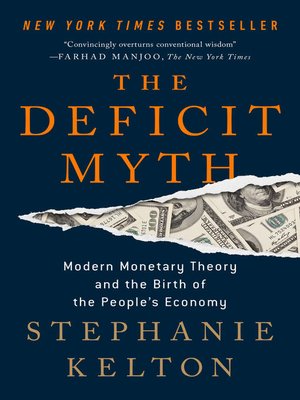
If it seems strange the federal government can owe itself money, well indeed, federal debt is strange. However, $6 trillion of the national debt is held by government agencies such as the Social Security Trust Fund. Conventional wisdom warns against using ‘deficits to solve problems we continue to think of the deficit itself as a problem’ (8).Ĭurrently the US national debt is more than $24 trillion, 106 per cent of GDP. However, the conventional wisdom regarding deficits is that they impede economic growth and weaken the economy. Kelton contends bigger deficits can strengthen an economy and lead to faster growth. Indeed, she argues that public deficits can be very healthy for an economy. Kelton argues that government spending properly targeted and government debt need not be problematic. Stephanie Kelton, in her new book The Deficit Myth: Modern Monetary Theory and the Birth of the People’s Economy, demonstrates that concerns about public debt overhang are ill-founded. The result is slower GDP growth and stagnation in worker’s wages and salaries. The increased taxes will lower consumption spending of households and investment spending of businesses. With debt-to-GDP ratios so high, mainstream economists warn there will be a debt overhang post-pandemic, which they proclaim will force a curtailment of public spending in the future and an increase in taxes.

The IMF anticipates the average debt-to-GDP ratios in advanced economies will rise above 120 per cent.

Japan’s public debt to GDP ratio is expected to grow above 250 per cent. The United States and the United Kingdom are projected to have public debt levels soar above 100 per cent of gross domestic product (GDP). Massive increases in government spending have offered relief to households and businesses, but according to many politicians and economists, this government spending has generated ‘national debt dilemmas.’ 2020.Ĭountries across the globe have shut down their economies in an effort to combat COVID-19. The Deficit Myth: Modern Monetary Theory and the Birth of the People’s Economy. Despain, shifting normative grounds of government spending away from the false and unproductive idea that deficits are irresponsible and ruinous towards the productive political activity of deciding which spending programmes should be prioritised.

This book is a triumph, writes Professor Hans G. In The Deficit Myth: Modern Monetary Theory and the Birth of the People’s Economy, Stephanie Kelton dispels six key myths that have shaped the conventional understanding of deficits as inherently bad, instead arguing that deficits can strengthen economies and lead to faster growth.


 0 kommentar(er)
0 kommentar(er)
